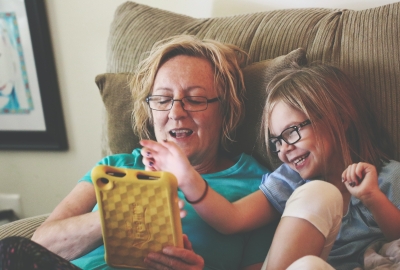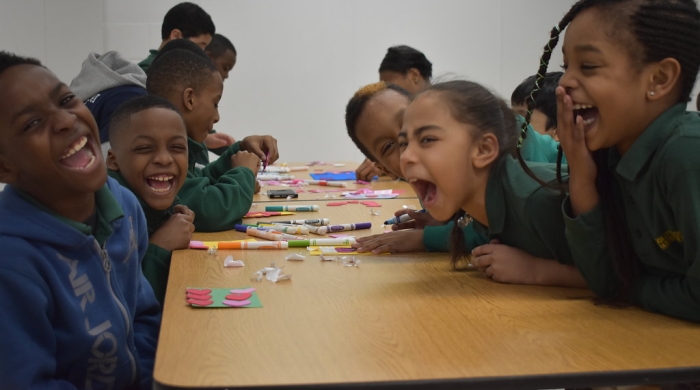
Written by Hannah Ellerbeck, Research Coordinator for the Chicago School Readiness Project
COVID-19 Hardships for At-Risk Youth and their Effect on Learning
Over the past few weeks most K-12 public schools in the U.S have transitioned to remote learning amidst the COVID-19 pandemic. This has caused students hardship as they grapple with the devastating impacts of the Coronavirus on their families, schools, and communities. It is only natural, district leaders have concluded, that such massive disruptions to students’ daily routines will take a toll on their academic learning.
Unfortunately, the hardships and subsequent academic toll may only deepen for students in low-income and poor families. Research has shown that poverty has a profound and predictable negative influence on child development, including language skills, physical and mental health, and academic achievement. COVID-19 will only exacerbate these problems as it magnifies economic inequality and reduces low-income families’ access to healthcare, food, jobs, and housing. Dr. Abenavoli, a Postdoctoral Research Associate at IHDSC, explains that “stressors and uncertainty surrounding the COVID-19 pandemic compound the stressors low-income communities already experience on a daily basis, making this an incredibly challenging time for families and children in these communities.”
Research tells us that high quality early education, and effective school and afterschool settings, are enormously influential for children's academic and life outcomes, with magnified effects for children growing up poor. This begs the question for educators and researchers alike, how can we facilitate successful learning for children in this challenging time? Furthermore, what programs or practices are most promising for children from low-income families who may be at greatest risk for suffering COVID-19-related academic setbacks?
Social-Emotional Learning as a Buffer
One avenue with promise to enhance learning and development is social-emotional learning (SEL). According to the Collaborative for Academic, Social, and Emotional Learning (CASEL), SEL is “the process through which children and adults acquire and effectively apply the knowledge, attitudes, and skills necessary to understand and manage emotions, set and achieve positive goals, feel and show empathy for others, establish and maintain positive relationships, and make responsible decisions.” CASEL breaks SEL into 5 core competencies:
- Self awareness: identifying emotions, recognizing strengths, self-confidence
- Self-management: impulse control, organization, stress management, listening, focusing
- Social awareness: putting yourself in others’ shoes, showing empathy, respect
- Relationship skills: communication, teamwork, social engagement
- Responsible decision making: ethical responsibility, solving problems, reflecting
Social-emotional learning enables children to form and maintain healthy relationships with others, work collaboratively to solve problems, and regulate their behavior and emotions. Children with strong SEL competencies perform better in school because they are able to focus on lessons and work collaboratively with peers and their teacher to facilitate learning. Dr. Abenavoli notes that “children who feel connected to their teachers and peers are more motivated to learn,” and “schools can and should support SEL because they are important life skills and facilitate academic learning.”
Young children in low-income families may especially benefit from efforts made by educators to support SEL. Travis Cramer, a former IES-PIRT fellow and doctoral student in the Psychology and Social Intervention program, explains that young children are “primed to acquire social-emotional competencies,” but “stress and lack of opportunities associated with poverty often cause children to enter school at a disadvantage in their academic and social-emotional development.” For this reason, “school-based initiatives to advance SEL can equip low-income children with foundational skills that will enable them to learn and thrive. Dr. Abenavoli adds that while all children can derive benefits from such initiatives, “they may be particularly beneficial for children experiencing poverty, trauma, and other stressors.”
Researchers have also leveraged this knowledge to design interventions seeking to offset the negative effects of poverty on children’s development by strengthening their SEL competencies. For example, the Chicago School Readiness Project, gave teachers resources to help preschool-aged children from low-income families improve their self-regulation skills, a core component of SEL. Children in preschools randomly assigned to receive the intervention displayed stronger math and reading skills at the end of preschool. Moreover, treatment effects have been observed through adolescence, where students who received the original intervention self-selected into stronger, better performing high schools than their counterparts.
Supporting SEL during COVID-19
It is clear that promoting SEL may be particularly important during this time, as children may struggle to understand and regulate their emotions in the face of added stress, maintain social and academic relationships in the age of social distancing, and focus on learning in an online format. SEL skills can particularly benefit low-income children, who are likely facing disproportionate levels of stress and hardship. As Dr. Abenavoli notes, “Social-emotional skills and the positive relationships they facilitate can be particularly powerful sources of resilience during times of great need.” Implementing SEL practices is not, by any means, sufficient to overcome academic setbacks during this crisis. However, an integration of SEL into academic learning may help children to cope during this extraordinary time - particularly children facing the highest risk for such setbacks.
So how can educators help support students' SEL during COVID-19? Below are ideas from IHDSC researchers and partners at Good Shepherd Services and remote resources for teachers.
- Establish a predictable routine for your remote classroom to help children manage stress and anxiety in an otherwise unpredictable time.
- Allow students opportunities for reflection by incorporating check-ins during morning meetings. Encourage students to discuss how they are feeling and what emotions they are experiencing.
- Implement structured SEL activities into the classroom, such as reading a book aloud and reflecting on characters’ emotions and problem-solving skills.
- Don’t forget about your own needs! Practicing self-care is especially important for teachers during this stressful time. Looking after your own mental and physical health will allow you to better support yourself and your students.
Remote Social-Emotional Learning Resources for Teachers
COVID-19 Picture Books: Discussing the Coronavirus with children can help them manage their stress and increase their social awareness regarding the issue— two important SEL skills. There are already a few online picture books to share with children or read aloud over a video platform:
- A Kid’s Guide to COVID-19 explains the virus in simple language young children can understand. Written by tinydocs, a web platform that provides illustrative resources to educate kids and families about health issues
- Coronavirus: A Book for Children uses more advanced language to discuss Coronavirus and its implications, which may be better for older children. The book is recommended by the Mississippi Department of Education.
COVID-19 Journal: Can be downloaded for free from Hub For Helpers, and contains worksheets related to the Coronavirus that teachers can implement into lessons or suggest as homework. Many of the worksheets target SEL competencies by helping children manage their emotions related to the Coronavirus and learn organization strategies.
- Example activity from journal: “My Worries Chart: List 5 things that cause you to worry or you wish you could change. Then write an X if it is something you can or can’t control.”
SEL Video Lessons:
CharacterStrong Virtual Resource Library: Teachers can register for free to gain access to their Videos with Questions resource- short videos for every different grade levels, including a K-2 section, that teach a variety of SEL skills and provide class discussion questions.
- Example video lesson website: Link to Sesame Street video (2 ½ minutes) teaching empathy, with discussion questions such as “How do Mark and Murray define empathy?” “How are you feeling today?”
Collaborative Learning Solutions: Provides daily SEL lessons teachers can implement into their remote classrooms. Lessons include links to short videos for elementary school students targeting SEL skills, such as focusing, and provides discussion questions and quick class activities related to the videos.
- Example video lesson from website: Link to GoNoodle video (4 minutes) with focusing exercise. Discussion questions include, “What did you notice about your focusing during this video?”
SEL Exercises and Strategies:
Greater Good in Education, a program created by UC Berkeley, provides a variety of short SEL exercises embedded in lessons that K-2 teachers can easily adapt for remote classrooms (they also provide exercises for higher grade levels)
- Example exercise from website: Lesson title: Drawing as a way to manage emotions. Includes the prompt, “Another thing that can help us calm down and feel better is to spend some time drawing, especially if we draw something that isn’t about what made us upset. We can draw about something that makes us happy, something or someone we love, something we like to do, a place we like to go, or anything we want”
This SEL article in Education Week discusses simple ways to implement SEL strategies into remote classrooms. Recommendations include conducting check-ins with students, encouraging students to write in journals, and reading books over Zoom (or video platform of choice.)
- Hint: Register on epic! for free e-books (contains popular titles such as “Diary of a Wimpy Kid” and “The Giving Tree”) to read aloud to students.
Chicago School Readiness Project
The aim of CSRP is to improve preschool-aged children's chances of success in school. CSRP targets young children's emotional and behavioral adjustment through a comprehensive, classroom-based intervention in Head Start.
Partnering to Improve Afterschool
What role can afterschool programs play in addressing inequality and promoting opportunities? The Advancing Collaborative Research in Out-of-School Settings (ACROSS) partnership represents a unique partnership between researchers from The Institute of Human Development and Social Change and Good Shepherd Services. Read a Q&A with Dr. Miranda Yates, Dr. Elise Cappella, and Sophia Hwang.



